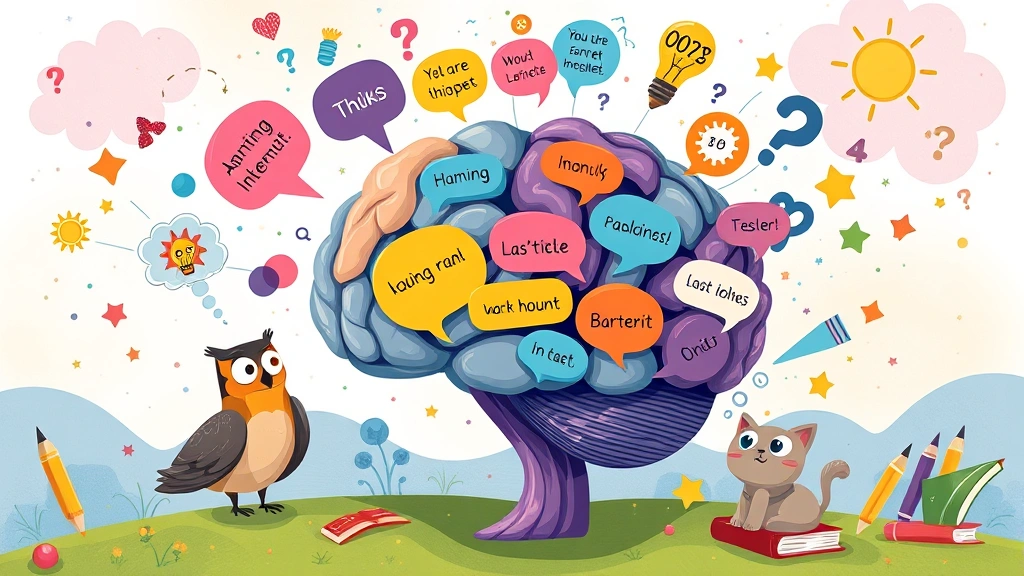Have you ever been scratching your head, wrestling with a tricky problem, or trying to come up with a brilliant idea, and wished you had a secret language to describe what was going on in your brain? Well, you’re in luck! The English language is absolutely overflowing with colorful, clever, and often hilarious idioms that perfectly capture the essence of thinking. From deep contemplation to sudden flashes of insight, these expressions add a wonderful richness to our conversations and writing.
Think of it this way: instead of just saying "I'm thinking," you could say you're "racking your brain" or "mulling something over." Doesn't that paint a much more vivid picture? Let’s dive into the fascinating world of idioms for thinking and explore how you can use them to sound like a native speaker and truly express the nuances of your mental processes.
Dive Deep: Idioms for Serious Thought
When you really need to put on your thinking cap and get down to business, these idioms are your best friends. They describe moments of intense concentration, problem-solving, and deep consideration.
1. Racking Your Brain
Have you ever tried to remember a forgotten name or solve a complicated puzzle, feeling like your brain is working overtime? That’s exactly what "racking your brain" means! It paints a picture of someone intensely trying to recall information or figure something out, almost as if they're stretching and straining their mental muscles.
- Meaning: To think very hard, usually to remember something or solve a problem.
- Example: "I've been racking my brain all morning trying to remember where I left my keys!"
- Origin: The word "rack" here comes from a medieval torture device, suggesting a painful or difficult effort. Don't worry, using your brain isn't actually painful, but it can feel like a tough workout!
2. Mull Something Over
Imagine a slow, gentle process, like simmering a delicious stew. When you "mull something over," you're not rushing to a decision. Instead, you're taking your time, considering all angles, and letting ideas develop gradually in your mind. It’s perfect for big decisions or complex ideas.
- Meaning: To think about something carefully for a long time before making a decision.
- Example: "I need a few days to mull over the job offer before I give them an answer."
- Usage Tip: This idiom suggests a thoughtful, deliberate approach, often for important matters.
3. Delve Into
When you "delve into" something, you're not just scratching the surface. You're going deep, exploring every detail, and investigating thoroughly. This idiom is perfect for research, analysis, or understanding a complex topic in depth.
- Meaning: To research, investigate, or explore something in great detail.
- Example: "The detective decided to delve into the suspect's past to find more clues."
- Analogy: Think of a miner digging deep into the earth for precious gems – you're digging deep into information!
4. Chew On (or Chew Over)
This idiom is quite vivid, isn't it? Just as you chew food to break it down and digest it, when you "chew on" an idea, you're taking your time to process it, think about it from different angles, and understand its implications. It’s a bit less intense than "racking your brain" and more about thoughtful consideration.
- Meaning: To think about something carefully and for a long time.
- Example: "That's an interesting proposal; I'll need some time to chew on it."
- Similar to: Mull something over, but perhaps with a slightly more active, internal dialogue.
5. Put On Your Thinking Cap
This one is a classic! When you "put on your thinking cap," you're signaling that it's time to get serious about a problem or a task that requires mental effort. It's a playful way to say, "Okay, brain, let's get to work!"

- Meaning: To begin to think seriously and carefully about a problem or task.
- Example: "Right, everyone, we need to solve this design challenge. Time to put on our thinking caps!"
- Visual: Imagine a whimsical cap that instantly boosts your brainpower!
Lightbulb Moments: Idioms for Sudden Ideas
Sometimes, thinking isn't a slow burn; it's a sudden flash! These idioms capture those exhilarating moments when an idea suddenly clicks, a solution appears, or inspiration strikes.
6. A Lightbulb Moment
This is perhaps one of the most universally understood visual metaphors for an idea. When you have "a lightbulb moment," it means a sudden, clear understanding or a brilliant idea has just popped into your head. It’s that "aha!" feeling we all love.
- Meaning: A moment of sudden realization, inspiration, or understanding.
- Example: "I was stuck on the puzzle for hours, and then, suddenly, I had a lightbulb moment and saw the solution!"
- Global Appeal: The image of a lightbulb illuminating above someone's head is recognized worldwide!
7. It Dawns On (Someone)
Just as the sun slowly rises and brings light to the world, when something "dawns on" you, it means you gradually or suddenly become aware of a fact or understanding that you hadn't grasped before. It often implies a realization that was previously overlooked.
- Meaning: To become clear or understood by someone, often gradually or unexpectedly.
- Example: "As he spoke, it dawned on me that I had forgotten her birthday."
- Subtlety: This can be a gentle realization, not always a dramatic flash.
8. Strike a Chord
While not exclusively about thinking, "striking a chord" often relates to an idea or statement that resonates deeply with your thoughts, feelings, or experiences. It means something connects with you on a profound level, often sparking related thoughts or memories.
- Meaning: To evoke a strong emotional response or a feeling of familiarity/agreement in someone.
- Example: "Her speech about perseverance really struck a chord with the audience."
- Musical Metaphor: Like a musical note that harmonizes perfectly.
Navigating Confusion: Idioms for Unclear Thoughts
Let's be honest, not all thinking is clear and concise. Sometimes, our minds are a bit muddled, or we're struggling to grasp a concept. These idioms perfectly describe those moments of mental fog.

9. Get Your Head Around Something
When something is complex or difficult to understand, you might struggle to "get your head around it." This idiom means to comprehend or accept something, especially something challenging or unusual.
- Meaning: To understand or accept something difficult or complicated.
- Example: "I'm finding it hard to get my head around the new tax regulations."
- Feeling: It suggests a mental wrestling match to make sense of information.
10. Draw a Blank
This is a common and relatable idiom. Have you ever tried to remember something, and your mind just goes completely empty? That's "drawing a blank." It's frustrating, but at least there's an idiom to describe it!
- Meaning: To be unable to find an answer, remember something, or think of anything.
- Example: "I tried to remember her name, but I just drew a blank."
- Origin: Possibly from games where you draw an empty card, or from a blackboard that is wiped clean.
11. Have a Brainstorm
This one is fantastic for collaborative thinking! When you "have a brainstorm" (or "brainstorm" as a verb), you're engaging in a rapid, free-flowing session of generating ideas, often with others. The goal is quantity over quality initially, letting all ideas flow.
- Meaning: To generate a lot of ideas quickly, often in a group.
- Example: "Let's have a quick brainstorm session to come up with some marketing slogans."
- Energy: Implies a lively, energetic exchange of thoughts.
General Thinking Idioms
These idioms are versatile and can describe various aspects of the thinking process, from consideration to mental agility.
12. Food for Thought
When someone gives you "food for thought," they've shared an idea, concept, or piece of information that is worth serious consideration. It's something that will keep your mind busy and encourage you to think deeply.
- Meaning: Something that provides material for careful consideration or reflection.
- Example: "His lecture on artificial intelligence gave me a lot of food for thought."
- Analogy: Just as food nourishes your body, ideas can nourish your mind.

13. Pick Someone's Brain
When you "pick someone's brain," you're not literally doing anything gruesome! You're asking them questions to gain information, advice, or ideas based on their knowledge and expertise. It's a way to tap into someone else's mental resources.
- Meaning: To ask someone a lot of questions to get information or ideas.
- Example: "I need to pick your brain about your experience traveling through Southeast Asia."
- Respectful: This idiom implies respecting someone's knowledge and wanting to learn from them.
14. A Penny for Your Thoughts
This charming idiom is a gentle invitation for someone to share what they are thinking, especially if they seem pensive or quiet. It's a way to encourage them to open up.
- Meaning: An informal way of asking someone what they are thinking about.
- Example: "You've been quiet for a while. A penny for your thoughts?"
- Polite Inquiry: A friendly and curious way to start a conversation about someone's internal world.
15. Think Outside the Box
This is a classic for innovation! To "think outside the box" means to think creatively, unconventionally, and from a new perspective, rather than following traditional or obvious methods. It's about breaking free from established patterns.
- Meaning: To think creatively, unconventionally, or from a new perspective.
- Example: "We need to think outside the box to solve this complex problem and find a unique solution."
- Challenge: Encourages imaginative and original solutions.
Idioms for Thinking: A Quick Reference
To help you remember and use these fantastic idioms, here’s a handy table summarizing their meanings and providing quick examples.
| Idiom | Meaning | Example |
|---|---|---|
| Racking Your Brain | To think very hard, usually to remember or solve something. | "I've been racking my brain trying to remember her name." |
| Mull Something Over | To think about something carefully for a long time. | "I need to mull over the offer before deciding." |
| Delve Into | To research or explore something in great detail. | "The historian delved into ancient texts." |
| Chew On / Chew Over | To think about something carefully and for a long time. | "I'll chew on your suggestion for a bit." |
| Put On Your Thinking Cap | To begin to think seriously and carefully. | "Time to put on our thinking caps for this challenge." |
| A Lightbulb Moment | A moment of sudden realization or inspiration. | "Then I had a lightbulb moment and knew the answer!" |
| It Dawns On (Someone) | To become clear or understood, often gradually or unexpectedly. | "It suddenly dawned on me that I was wrong." |
| Strike a Chord | To evoke a strong emotional response or feeling of familiarity. | "Her story struck a chord with many people." |
| Get Your Head Around | To understand or accept something difficult or complicated. | "I can't get my head around quantum physics." |
| Draw a Blank | To be unable to find an answer, remember something, or think of anything. | "I tried to recall his name, but I just drew a blank." |
| Have a Brainstorm | To generate a lot of ideas quickly, often in a group. | "Let's have a quick brainstorm for new product ideas." |
| Food for Thought | Something that provides material for careful consideration. | "His comments certainly gave me food for thought." |
| Pick Someone's Brain | To ask someone a lot of questions to get information or ideas. | "Can I pick your brain about your marketing strategy?" |
| A Penny for Your Thoughts | An informal way of asking someone what they are thinking about. | "You're quiet. A penny for your thoughts?" |
| Think Outside the Box | To think creatively, unconventionally, or from a new perspective. | "We need to think outside the box to solve this unique problem." |
Frequently Asked Questions About Idioms for Thinking
Q1: Why are idioms important for communication?
A1: Idioms are super important because they add color, nuance, and vivid imagery to our language. They allow us to express complex ideas or feelings in a concise and memorable way. Using idioms makes your English sound more natural and fluent, and it helps you understand native speakers better. Plus, they're often quite fun to use!
Q2: How can I learn and remember new idioms effectively?
A2: Great question! Here are a few tips:
- Context is Key: Don't just memorize definitions. Try to understand the situation in which an idiom is used.
- Visualize: Many idioms create a mental image (like a lightbulb turning on!). Visualizing helps them stick.
- Practice, Practice, Practice: Try to use new idioms in your conversations or writing. The more you use them, the more natural they'll feel.
- Keep a Journal: Write down new idioms you encounter, along with their meanings and an example sentence.
- Engage with English Media: Watch movies, TV shows, listen to podcasts, and read books in English. You'll hear idioms used naturally.
Q3: Are these idioms used in both formal and informal settings?
A3: Most of the idioms listed here are quite versatile and can be used in both informal conversations and moderately formal settings (like a business meeting or a presentation). However, some are more informal than others. For instance, "a penny for your thoughts" is definitely informal, while "food for thought" can fit into a more formal discussion. When in doubt, it's always safer to stick to more direct language in highly formal or academic contexts.
Q4: Can I create my own idioms?
A4: While new expressions and slang emerge all the time, true idioms are usually established phrases that have become widely understood over time by a community of speakers. So, while you can certainly invent new ways of saying things, for an expression to become an "idiom," it needs to be adopted and used consistently by many people. It's a fascinating linguistic process!
Q5: Do other languages have similar "thinking" idioms?
A5: Absolutely! Every language has its own unique set of idioms, and many cultures have expressions for thinking, problem-solving, and sudden insights. They might not translate directly, but the concept of using figurative language to describe mental processes is universal. Exploring idioms in different languages is a fantastic way to understand cultural nuances in thinking!
Key Takeaways
- Idioms for thinking add richness and precision to your English, allowing you to describe mental processes vividly.
- They range from describing deep concentration ("racking your brain," "mulling over") to sudden insights ("lightbulb moment," "it dawns on").
- Some idioms help describe confusion ("get your head around," "draw a blank"), while others encourage creative problem-solving ("think outside the box").
- Using these idioms makes your English sound more natural, engaging, and sophisticated.
- Practice and context are crucial for mastering idioms. Don't be afraid to try them out in your daily conversations!
So, the next time you're deep in thought, struggling with a problem, or experiencing a sudden burst of inspiration, remember these fantastic idioms. Not only will they help you express yourself more clearly and colorfully, but they'll also make your English sound truly authentic and engaging. Go forth and think brilliantly – and don't forget to use these wonderful expressions while you're at it!






